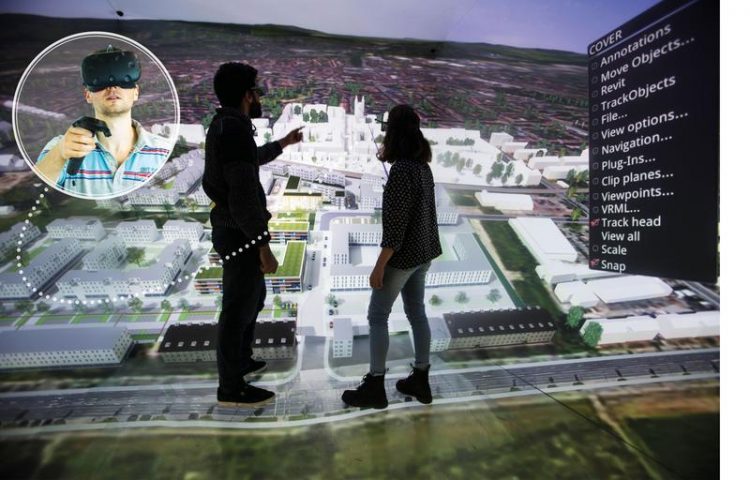Virtual Reality Environments for the Home Office

Collaborative, interactive VR visualization of a multigenerational community center. Fabian Dembski University of Stuttgart, HLRS
Simulations using supercomputers or construction data from CAD systems are normally visualized and analyzed in a Cave 3D facility. In an era of “social distancing” resulting from the coronavirus pandemic, however, this is not always possible.
Visualization experts from six universities in Baden-Württemberg, working together in a project titled “Virtual Collaboration Laboratories Baden-Württemberg” (KoLab), have developed a new software platform that makes it possible for persons located in different places to meet and collaborate in virtual environments (virtual reality and augmented reality, VR/AR).
Using new VR-software developed by KoLab, combined with inexpensive, commercially available VR-headsets and controllers, teams of scientists, researchers, developers, and users can gather in a virtual meeting room, with hardware located wherever is most convenient.
Meeting participants are represented by avatars that can communicate in virtual reality, where they can collaboratively observe, analyze, and interact with 3D visualizations — all from their workplaces or even home offices.
Especially in situations where spontaneous in-person meetings are difficult — for example, when colleagues work at different locations, or when new kinds of challenging conditions arise, such as the “social distancing” that has become necessary due to current the coronavirus pandemic — this technology will empower collaboration and dramatically simplify complicated work processes.
Even in times without the coronavirus pandemic, it will accelerate scientific discovery and significantly shorten the time it takes to bring new products to market. It is also expected that the new software will prove to be extremely useful for education and training.
It will not only support and simplify education of students at universities but could also be integrated into modern distance learning frameworks.
The KoLab-BW project is a collaboration among researchers at the High-Performance Computing Center Stuttgart (HLRS), the Visualization Research Center of the University of Stuttgart (VISUS), Ulm University, the Competence Center for Virtual Reality at the Mannheim University of Applied Sciences, Albstadt-Sigmaringen University, and the University of Applied Sciences Ravensburg-Weingarten.
Funding for the project was provided by the Baden-Württemberg Ministry for Science, Research and Art.
Dr. Uwe Wössner, University of Stuttgart, High-Performance Computing Center Stuttgart, Tel. +49 (0) 711 / 685-65790, E-Mail: woessner@hlrs.de
Christopher Williams, University of Stuttgart, HLRS, Tel. +49 (0) 711 / 685-62517, E-Mail williams@hlrs.de
Media Contact
More Information:
http://www.uni-stuttgart.de/All latest news from the category: Information Technology
Here you can find a summary of innovations in the fields of information and data processing and up-to-date developments on IT equipment and hardware.
This area covers topics such as IT services, IT architectures, IT management and telecommunications.
Newest articles

Recovering phosphorus from sewage sludge ash
Chemical and heat treatment of sewage sludge can recover phosphorus in a process that could help address the problem of diminishing supplies of phosphorus ores. Valuable supplies of phosphorus could…

Efficient, sustainable and cost-effective hybrid energy storage system for modern power grids
EU project HyFlow: Over three years of research, the consortium of the EU project HyFlow has successfully developed a highly efficient, sustainable, and cost-effective hybrid energy storage system (HESS) that…

After 25 years, researchers uncover genetic cause of rare neurological disease
Some families call it a trial of faith. Others just call it a curse. The progressive neurological disease known as spinocerebellar ataxia 4 (SCA4) is a rare condition, but its…





















